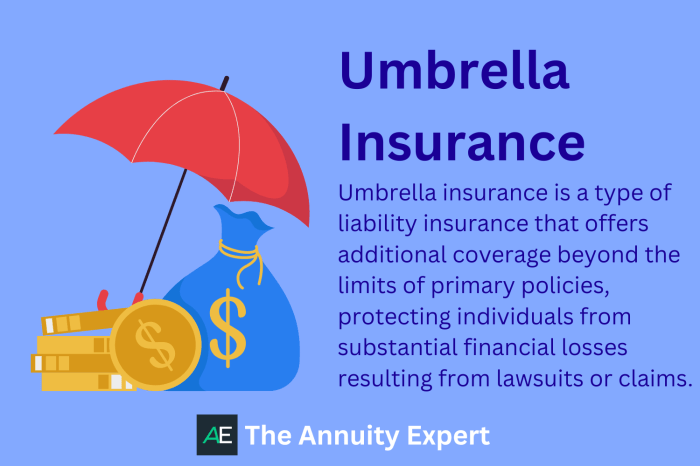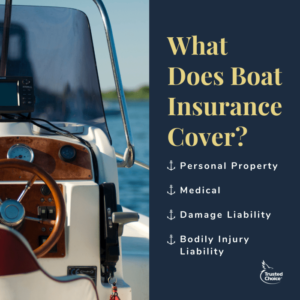
Who qualifies for umbrella insurance? This question is crucial for individuals looking to enhance their liability protection beyond standard policies. Umbrella insurance serves as a safety net, providing additional coverage in various situations, ultimately offering peace of mind to those who own significant assets or engage in activities that could lead to potential lawsuits.
In essence, understanding umbrella insurance allows individuals to assess their unique circumstances, determine their eligibility, and recognize the advantages of securing this additional layer of protection. With increasing liabilities in today’s world, knowing who can benefit from this coverage becomes essential for safeguarding one’s financial future.
Understanding Umbrella Insurance
Umbrella insurance serves as a valuable safety net that extends beyond the limits of standard insurance policies. Its primary purpose is to provide an additional layer of liability protection, ensuring that individuals are safeguarded against significant financial losses that may arise from legal claims or damages. This type of insurance is designed to cover personal liability claims, including bodily injury, property damage, and certain lawsuits.
It kicks in when the limits of your standard liability insurance, such as auto or home insurance, have been exhausted. This means that if you find yourself facing a lawsuit for damages that exceed your existing policy limits, umbrella insurance can help cover the additional costs, protecting your assets and savings.
Key Coverage Aspects of Umbrella Insurance
Umbrella insurance offers coverage for a variety of scenarios that may not be fully addressed by standard liability policies. Understanding these key aspects can help you gauge the importance of this form of insurance. Below are the main coverage components:
- Bodily Injury Liability: This covers medical expenses and legal fees if you cause injury to someone else, whether in an accident or through negligent behavior.
- Property Damage Liability: This protects you from financial loss due to damage you cause to someone else’s property.
- Personal Liability: This includes coverage for claims such as defamation, invasion of privacy, and false arrest, which may not be covered under standard policies.
- Legal Defense Costs: Umbrella insurance often includes coverage for legal fees, which can be substantial even if the lawsuit is ultimately unfounded.
“Umbrella insurance acts as an additional shield, ensuring that your wealth and future are not jeopardized by unexpected legal claims.”
Comparison with Standard Liability Insurance Policies
When comparing umbrella insurance with standard liability coverage, it’s crucial to note the differences in scope and limits. Standard liability policies, such as auto or homeowners insurance, have specific coverage limits that vary widely. Umbrella insurance, on the other hand, generally provides higher limits, often starting at $1 million and increasing from there.To clearly illustrate these differences, consider the following points:
- Coverage Limits: While standard policies might cover up to $300,000 for a lawsuit, umbrella policies start at $1 million, making them more effective for higher-risk scenarios.
- Scope of Protection: Standard liability insurance often excludes certain types of claims, such as those related to personal injury, which umbrella insurance typically covers.
- Affordability: Umbrella insurance is relatively inexpensive compared to its coverage limits, making it a cost-effective way to enhance overall liability protection.
- Global Coverage: Unlike standard policies that may limit coverage to certain jurisdictions, umbrella insurance often provides worldwide coverage, ideal for frequent travelers.
“Investing in umbrella insurance is not just about protecting your assets; it’s about ensuring peace of mind in an unpredictable world.”
Who Qualifies for Umbrella Insurance?

Umbrella insurance can provide an extra layer of protection for individuals and families who want to safeguard their assets against unforeseen events. Understanding who qualifies for this type of insurance is crucial for those considering additional coverage beyond standard policies.There are specific eligibility criteria and target demographics that often lead individuals to seek out umbrella insurance. Typically, this coverage is suited for those with substantial assets or potential risks in their daily lives.
Several key factors can influence the necessity for additional liability coverage.
Eligibility Criteria for Umbrella Insurance
Individuals seeking umbrella insurance generally need to meet certain criteria before they can qualify. This often includes having underlying insurance policies, as umbrella insurance is designed to extend liability coverage beyond those limits. The following conditions typically apply:
- Existing Homeowners or Renters Insurance: Most insurers require policyholders to have a standard home or renters insurance policy in place.
- Auto Insurance Coverage: A valid auto insurance policy is usually mandatory, ensuring that basic liability limits are established.
- Financial Stability: Insurers often assess your net worth to determine the appropriate level of coverage that matches your assets.
- No Recent Claims or High-Risk Activities: A clean claims history can facilitate qualification, while certain high-risk activities may lead to higher premiums or denied coverage.
Individuals and Groups Most Likely to Need Umbrella Insurance
Several categories of individuals or groups are particularly well-suited for umbrella insurance due to their lifestyles, financial status, or professional roles. Here are the types that typically benefit from this additional coverage:
- High Net Worth Individuals: Those with significant assets such as real estate, investments, or savings may require more coverage to protect against lawsuits that could jeopardize their wealth.
- Business Owners: Entrepreneurs and small business owners may face increased liability risks, making umbrella insurance a prudent choice for asset protection.
- Families with Teen Drivers: Households with young or inexperienced drivers are at higher risk for accidents, underscoring the need for additional liability coverage.
- Frequent Travelers: Individuals who travel often may encounter unique risks that could necessitate greater protection.
Factors Influencing the Requirement for Additional Coverage
Various factors can determine whether an individual or family requires umbrella insurance. These circumstances can elevate the risk of liability exposure, making additional coverage advantageous.
- Property Ownership: Owning multiple properties or rental units increases exposure to potential lawsuits stemming from accidents or injuries on those properties.
- Active Lifestyle: Engaging in sports, recreational activities, or community services can lead to unforeseen liabilities, prompting a need for umbrella coverage.
- Public Exposure: Individuals in public-facing roles, such as politicians, celebrities, or influencers, may be at higher risk for defamation or personal injury claims.
- Family Dynamics: Families with children or dependents may wish to safeguard assets for future generations, making umbrella insurance a strategic choice.
“Umbrella insurance acts as a safety net, ensuring peace of mind for those with substantial assets or potential liability risks.”
Related Insurance Types

Understanding various insurance types beyond umbrella insurance is crucial for individuals seeking comprehensive protection. Each insurance type serves a specific purpose and can be beneficial depending on personal circumstances. Here, we dive into several related insurance types that complement or provide coverage in different areas of life.
Pet Insurance
Pet insurance is increasingly important for pet owners, offering a safety net for veterinary expenses. It helps cover costs associated with unexpected illnesses or accidents, ensuring that pets receive the necessary care without financial strain. Pet insurance typically includes coverage for routine check-ups, vaccinations, and more serious medical conditions. Many plans also offer additional services, such as behavioral therapy and dental care.
Given that the average vet visit can range from $50 to over $1,000, having this insurance can make a significant difference in managing healthcare costs for pets.
Supplemental Insurance
Supplemental insurance serves as an additional layer of protection to primary health plans. It is designed to cover specific medical expenses that may not be included in standard health insurance policies. Common types of supplemental insurance include critical illness, accident, and dental insurance. For instance, critical illness insurance can provide a lump-sum payment upon diagnosis of serious conditions like cancer or heart disease, which can be used for treatment or recovery expenses.
This additional coverage can greatly alleviate the financial burden during challenging health situations.
Travel Insurance
Travel insurance is an essential consideration for anyone embarking on a trip, providing coverage for unexpected incidents such as trip cancellations, lost luggage, or medical emergencies while abroad. Many travel insurance policies cover a range of incidents, including emergency medical expenses, trip interruption, and evacuation. For example, if a traveler suffers an injury while on a trip, travel insurance can cover hospital stays and transportation back home.
This peace of mind allows travelers to enjoy their adventures without worrying excessively about potential mishaps.
Vision Insurance
Vision insurance is a specialized form of coverage focused on eye care. It typically covers routine eye exams, glasses, and contact lenses, which are essential for maintaining good vision and eye health.Most vision insurance plans offer benefits that can significantly reduce out-of-pocket costs for eye care. For instance, a standard plan may cover an annual eye exam at little to no cost, and offer discounts on the purchase of eyewear.
Given the increasing strain of digital screens on vision health, this type of insurance is becoming more relevant for individuals of all ages.
Watercraft Insurance
Watercraft insurance is crucial for boat owners, providing coverage against accidents, theft, and liability related to watercraft activities. Policies typically include coverage for physical damage to the watercraft, medical payments for injuries sustained by passengers, and liability coverage for damage to other vessels or property. For example, if a boater accidentally collides with another boat, watercraft insurance can cover repair costs and legal fees arising from the incident.
This protection is vital for ensuring that boating remains a safe and enjoyable pastime.
Comparison Chart for Umbrella Insurance and Related Policies
To better understand how umbrella insurance compares to other related insurance types, the following table highlights key features of each policy:
| Insurance Type | Coverage Area | Typical Benefits | Importance |
|---|---|---|---|
| Umbrella Insurance | Personal liability | Additional coverage beyond home and auto policies | Protects assets from large claims |
| Pet Insurance | Veterinary expenses | Covers medical costs for pets | Ensures affordable healthcare for pets |
| Supplemental Insurance | Medical expenses | Covers gaps in primary health plans | Reduces out-of-pocket costs during health issues |
| Travel Insurance | Travel-related incidents | Covers trip cancellations and emergencies | Provides security for travelers |
| Vision Insurance | Eye care | Covers eye exams and eyewear | Supports eye health and reduces costs |
| Watercraft Insurance | Boating incidents | Covers liability and physical damage | Ensures safety and financial protection for boaters |
Conclusion
In summary, the landscape of umbrella insurance reveals that while it may not be necessary for everyone, various individuals—especially those with considerable assets or involved in high-risk activities—stand to gain significant advantages. By exploring the qualifications for umbrella insurance, you can make informed decisions that enhance your protection against unforeseen liabilities. Ultimately, taking this proactive step can provide you with a stronger financial foundation and greater peace of mind.
FAQ Explained
What is the primary benefit of umbrella insurance?
The primary benefit of umbrella insurance is that it provides additional liability coverage beyond what standard policies offer, protecting your assets from unforeseen claims.
Is umbrella insurance expensive?
No, umbrella insurance is generally affordable, especially considering the extensive coverage it provides compared to the cost of standard liability insurance.
Do I need to have other insurance policies to qualify for umbrella insurance?
Yes, most insurers require you to have certain underlying policies, such as home or auto insurance, before you can purchase umbrella coverage.
Can renters benefit from umbrella insurance?
Absolutely! Renters can also benefit from umbrella insurance, especially if they have significant assets or engage in activities that could lead to liability claims.
Does umbrella insurance cover all types of claims?
No, umbrella insurance does not cover every type of claim; it typically excludes intentional acts and certain business-related liabilities.




